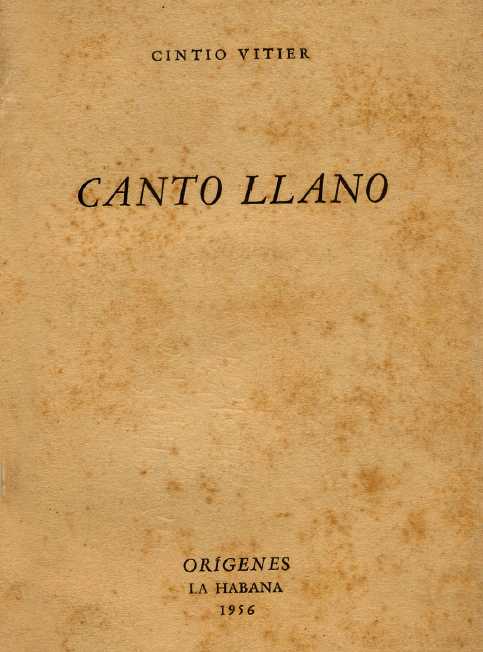4.1.2.9.7 The poetry collection “Canto llano”, 1955, by Cintio Vitier (1921 – 2009)

The poetic notebook “Canto llano” (Plain Song) marks a new phase in Cintio Vitier’s work, defined by its continuity but also by its frequent departures from the previously dominant poetic tone. In this work, faith becomes the root substance of a new worldview, one of optimism that transcends circumstances and demands communication, finding its expansive vehicle in formulas akin to oral tradition.
The text consists of 50 poems, each numbered only, perhaps to convey the simplicity of this poetic proposal. The first text already announces the essence of this collection of poems as a lyrical transcription of the religious discovery that occurred in Cintio’s life, and throughout, the celebratory tone is evident, the transcendence per se of the circumstances, which does not require a far-fetched aestheticism to capture:
“Something was changing and it wasn’t the change,
something came without coming.
It was a silent order
that I did not want to fulfill.”
The collection of poems addresses different areas of reality without attempting expressive bombast, among them desire, as a dissatisfaction that attempts to be filled with what the world offers but always results in emptiness; although it has already accepted it as a void that cannot be filled by a mere change in the forms of literature but rather encompasses a deeper dimension of the medium. In this sense, it affirms: “Between desire and things / the being is torn apart, sullen.”
He also questions the inevitability of the time that was and the vision of others, from a lyricism that doesn’t occupy the foreground but rather subordinates itself to the equal avalanche of his ideas and emotions; but without abandoning the aesthetic sculpting of the pieces, nor the elaboration of a precise, though not excessively refined, vocabulary in keeping with his perspective of pure poetry:
“When they say: He was like this,
I will not be able to rectify
the nuances, the flavors
of my lost truth.
And I’ll have to settle,
still roaring like the sea,
with the dark versions
of the mystery of my chance.”
Poem XVI, for its part, expresses the value of life over intellectual inquiry into circumstances and knowledge, the sense of a journey and not a goal that is sometimes diluted in the elements that make up our culture:
“Yes, search, but in the search
don’t lock yourself in;
look how life goes by,
that dawn exists.
Look, it doesn’t contain anything.
the dark sphinx,
that the world is overflowing
of what you ask for.
(…)
Look how life goes by,
that dawn exists.”








